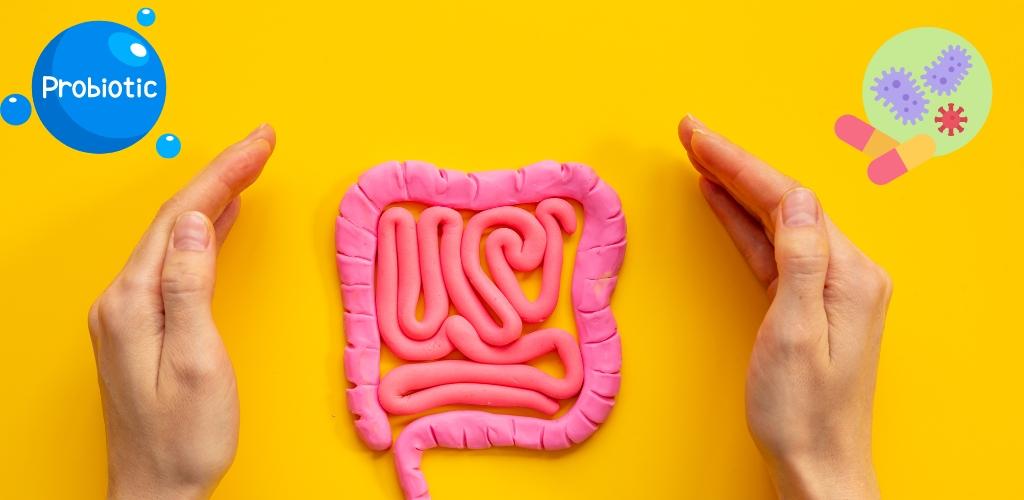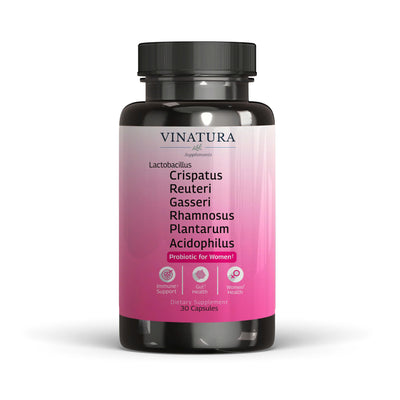
Probiotic Vs Antibiotic: What's The Difference Between Them?
Probiotics and antibiotics are two crucial concepts in medicine and health. As you know, the balance in our gut microbiota plays a significant role in our health. It's not just a diverse community of bacteria; it's a complex ecosystem constantly interacting with our bodies. In the medical world, two terms often mentioned concerning gut microbiota and health are "probiotic" and "antibiotic," regarding maintaining gut microbial health and balance. Although they relate to gut microbiota, each has contrasting and important impacts. So, let's explore the differences between probiotics and antibiotics
Before exploring further, please read the disclaimer located at the end of this webpage.
Key Takeaways
- Probiotics are live microorganisms, often bacteria or yeasts, beneficial to human health when consumed adequately. They help support digestion and enhance the immune system. They can be found in fermented dairy products such as yogurt, kefir, and some types of cheese, as well as in supplement form.
- Antibiotics are chemical substances that kill or inhibit the growth of disease-causing bacteria. Antibiotics can be classified based on their mode of action or the type of bacteria they target.
- It's advisable to supplement with probiotics during antibiotic use. The gut microbiota can be disrupted during antibiotic therapy, leading to issues like antibiotic-associated diarrhea. Supplementing with probiotics during this time can help restore gut microbiota balance and minimize side effects.
Probiotic Vs Antibiotic: What's The Difference Between Them?
From the outset, the differences between probiotics and antibiotics are apparent just by looking at their names. They vary in many aspects, from their nature and purpose of use to their mechanisms of action.
Nature:
- Probiotics: These are beneficial living microorganisms, primarily bacteria and yeast. They are commonly found in fermented dairy products, yogurt, and dietary supplements.
- Antibiotics are chemical compounds or natural substances used to kill or inhibit the growth of disease-causing bacteria.
Purpose of Use:
- Probiotic: Used to improve and maintain digestive health, boost the immune system.
- Antibiotic: Used to treat and eliminate certain bacterial infections such as sore throat, skin infections, and other bacterial infections.
Impact on Bacteria:
- Probiotic: Enhances beneficial bacteria and maintains the balance of the gut microbiota.
- Antibiotic: Kills or inhibits disease-causing bacteria but can also eradicate beneficial bacteria in the gut microbiota, leading to microbial imbalance.
Side Effects:
- Probiotic: Generally safe with few side effects. However, adverse reactions such as bloating or infections may occur in some individuals, particularly those with weakened immune systems.
- Antibiotics: Can cause side effects such as allergies, digestive disorders (diarrhea, nausea), and adversely affect the body's natural microbial flora.
Can You Take Probiotics And Antibiotics At The Same Time?

The answer is "yes," but it's important to follow some guidelines to maximize effectiveness and minimize potential issues.
- Timing: Antibiotics can kill both harmful and beneficial bacteria in your gut. To prevent antibiotics from destroying probiotics, take a probiotic supplement a few hours after taking antibiotics. A common recommendation is to take probiotics at least 2 to 3 hours after antibiotics. This ensures that a sufficient amount of live probiotic bacteria survive and colonize your gut. Continue taking probiotics for several weeks after completing the antibiotic course to restore gut-bacterial balance.
- Consult with Your Doctor: If you have any underlying conditions or are taking other medications, always consult your doctor before starting any probiotic regimen.
- Quality of Probiotics: Choose high-quality probiotic supplements that have been tested for potency and purity. Look for products that guarantee the number of live microorganisms until the expiration date.
It's important to space them out by a few hours to ensure probiotics can survive and colonize the gut effectively. Continuing probiotic supplementation after completing an antibiotic course may help restore gut microbiota balance.
How To Take Probiotics And Antibiotics Effectively?
To ensure optimal effectiveness when taking probiotics and antibiotics together, consider the following guidelines to prevent interference:
- Timing: Take probiotics at least 2 to 3 hours after taking antibiotics. This helps ensure antibiotics do not immediately kill beneficial probiotic bacteria after ingestion.
- Consistent Probiotic Use: Take probiotics daily throughout the antibiotic course and continue for at least 1 to 2 weeks after completing the antibiotic course to help restore gut microbiota.
- Choose Suitable Probiotic Strains: Choose probiotics containing strains such as Lactobacillus rhamnosus GG, Saccharomyces boulardii, and Bifidobacterium. These strains have been researched and shown to effectively promote gut microbiota balance.
- Physician Consultation: If you have health concerns or are taking other medications, consult a doctor or healthcare professional before starting probiotics.
What Are The Benefits Of Probiotics for Your Health?

As you know, probiotics offer many health benefits, especially in maintaining and improving the body's microbial balance, particularly in the gut.
- Digestive Support: Probiotics help balance beneficial and harmful bacteria in the gut, promoting efficient digestive function. Probiotics can also help reduce bloating, abdominal pain, and diarrhea or constipation.[1]
- Weight Management Support: Probiotics may aid in reducing belly fat and maintaining ideal weight by influencing metabolism and satiety. Some probiotic strains may help the body digest and absorb fats more effectively, supporting weight loss efforts.[1]
- Improvement of Skin Issues: Probiotics can prevent and treat acne.
- Immune System Enhancement: Probiotics may enhance immune system activity effectively.
Exploring The Benefits Of Antibiotic

Antibiotics play a crucial role in modern medicine, helping to treat and prevent many dangerous infections. Antibiotics are chemical compounds or natural substances that can kill or inhibit the growth of disease-causing bacteria.
- Prevention of Wound Infections: After surgery, antibiotics are often used to prevent wound infections, facilitating the healing process.[2]
- Elimination of Disease-Causing Bacteria: Antibiotics are highly effective in killing disease-causing bacteria, helping to cure infections such as pneumonia, sore throat, skin infections, and urinary tract infections. Timely antibiotic use can prevent the spread of infection, reducing the risk of disease outbreaks in the community.[2]
- Emergency Treatment: In emergencies such as severe trauma or open wounds, antibiotics may be used to prevent infection from the external environment.
- Minimizing Illness Duration: Antibiotics help reduce the duration of illness, allowing patients to recover faster and return to normal life sooner.[2]
Considerations
- Correct Dosage Usage: Proper use of antibiotics requires adherence to the prescribed dosage and duration by the doctor to ensure treatment effectiveness and prevent antibiotic resistance.
- Avoid Misuse: Misuse of antibiotics can lead to dangerous conditions, making bacteria resistant and more challenging to treat in the future.
Conclusion
In conclusion, while both probiotics and antibiotics play crucial roles in human health, they operate through distinct mechanisms. Antibiotics combat harmful bacteria, while probiotics promote the growth of beneficial bacteria. Understanding their differences is essential for making informed decisions about our health and wellness.
References
- [1] NCCIH. (2016). Probiotics: What You Need To Know. [online] Available at: https://www.nccih.nih.gov/health/probiotics-what-you-need-to-know [Accessed 9 Aug. 2024].
- [2] SALKIND, A.R. and RAO, K.C. (2011). Antibiotic Prophylaxis to Prevent Surgical Site Infections. American Family Physician, [online] 83(5), pp.585–590. Available at: https://www.aafp.org/pubs/afp/issues/2011/0301/p585.html [Accessed 9 Aug. 2024].
Author

Product Disclaimer
Including an ingredient or study does not evaluate, endorse, or recommend any Vinatura product or any third-party product. Some ingredients discussed may not be used in any Vinatura product.
The content of the articles has not been evaluated by the Food and Drug Administration (FDA) and is not intended to promote or endorse any specific product. Any products sold on this website are not intended to diagnose, treat, cure, or prevent any disease.
Opinions and Endorsements
Any claims, statements, or opinions expressed in the articles are those of the author(s) and do not necessarily reflect the views or opinions of the manufacturers of the dietary supplement products. The products sold on this website are separate from the content of the articles and are not directly endorsed or associated with the information presented here.
Liability Disclaimer
The author(s) of the articles, website, and manufacturers of the dietary supplement products do not assume any liability for any potential consequences arising from the use of the information provided in the articles. Ingredient effects, dosages, and safety vary by individual, formulation, and context; some ingredients interact with medications or may be unsuitable during pregnancy or lactation. It is recommended that individuals consult with a qualified healthcare professional before making any dietary or lifestyle changes, including the use of dietary supplements.
Product Usage
Please refer to the product labels and packaging for specific usage instructions and guidelines for the dietary supplement products sold on this website.
Customer Support
For any concerns or questions regarding the dietary supplement products, please contact our customer support team, who will be more than happy to assist you.





Leave a Comment
Be the first to comment.
What do you think?